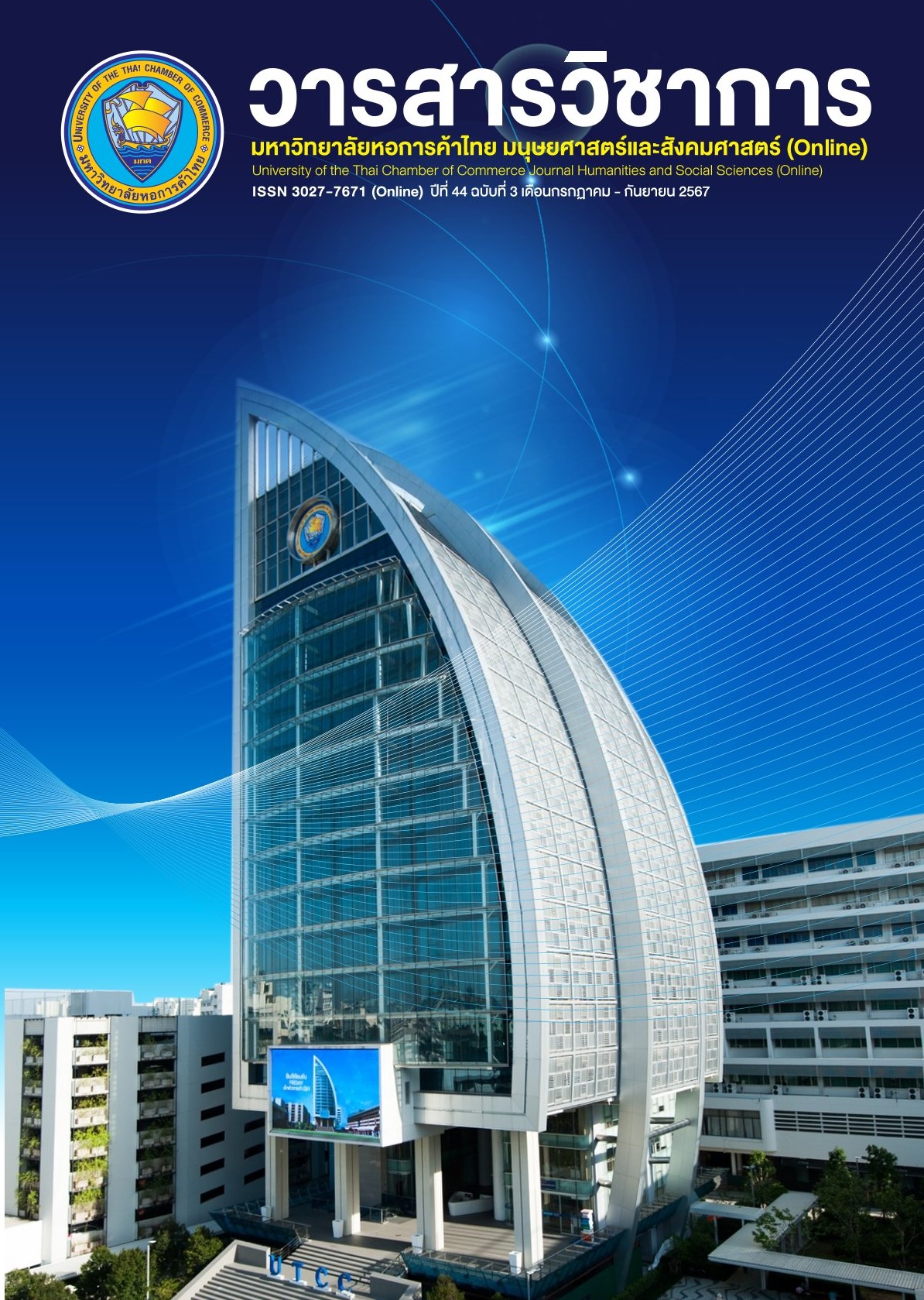มาตรการทางกฎหมายเกี่ยวกับเงินกู้นอกระบบ กรณีศึกษาพื้นที่ 4 อำเภอในจังหวัดอุดรธานี
Main Article Content
บทคัดย่อ
สืบเนื่องจากสถานการณ์เศรษฐกิจของประเทศไทยในปัจจุบัน ที่มีการชะลอตัวลง อาจทำให้การบริโภคและการลงทุนภาคเอกชน และรายได้ในระบบเศรษฐกิจปรับตัวลดลง เกิดปัญหาการว่างงานในอัตราที่สูงขึ้น ทำให้ประชาชนจำนวนมากขาดรายได้ รวมทั้งก่อนหน้าการเกิดสถานการณ์การแพร่ระบาดของโรคโควิด 19 ในประเทศไทย มีการชะลอตัวทางเศรฐกิจจากสงครามการค้า ซึ่งทำให้มีปัญหาค่าครองชีพที่สูงขึ้น ส่งผลทำให้ประชาชนมีรายได้ไม่เพียงพอต่อรายจ่าย เป็นเหตุให้เกิดการกู้ยืมเงินทั้งในและนอกระบบ โดยลูกหนี้นอกระบบส่วนใหญ่เป็นผู้ที่มีรายได้น้อยไม่สามารถกู้ยืมเงินในระบบได้ จึงต้องใช้บริการการกู้ยืมเงินจากนอกระบบซึ่งเป็นการกู้ยืมเงินกันเองระหว่างประชาชน โดยผู้ให้กู้ยืม
ส่วนใหญ่มีการกำหนดอัตราดอกเบี้ยที่สูงเกินกว่ากฎหมายกำหนด และมีวิธีการทวงหนี้ที่ใช้การข่มขู่บังคับ หรือใช้ความรุนแรง ปัญหาเจ้าหนี้นอกระบบเป็นปัญหาที่เกิดขึ้นในหลายๆ ประเทศทั่วโลกกลายเป็นปัญหาทางสังคมและปัญหาอาชญากรรมตามมา อย่างไรก็ดี การแก้ไขปัญหาที่ผ่านมาสามารถแก้ปัญหาได้ในระดับหนึ่งแต่ยังไม่ครอบคลุมการแก้ไขปัญหาเจ้าหนี้นอกระบบทั้งหมด ซึ่งอาจมีการเปลี่ยนแปลงไปตามการเปลี่ยนแปลงของรัฐบาล และส่วนใหญ่เน้นการแก้ไขปัญหาในระยะสั้น ทำให้ในอนาคตอาจจะเกิดปัญหาเพิ่มขึ้นอีกได้ จึงมีความจำเป็นต้องศึกษาเพื่อหามาตรการทางกฎหมายเพื่อให้มีแนวทางการดำเนินงานที่ชัดเจนเพื่อให้ภาครัฐสามารถดำเนินการแก้ไขปัญหาเจ้าหนี้นอกระบบได้อย่างยั่งยืนต่อไป
Article Details

อนุญาตภายใต้เงื่อนไข Creative Commons Attribution-NonCommercial-NoDerivatives 4.0 International License.
ลิขสิทธิ์ของบทความ
ผลงานที่ได้รับการตีพิมพ์ถือเป็นลิขสิทธิ์ของมหาวิทยาลัยหอการค้าไทย ห้ามมิให้นำเนื้อหา ทัศนะ หรือข้อคิดเห็นใด ๆ ของผลงานไปทำซ้ำ ดัดแปลง หรือเผยแพร่ ไม่ว่าทั้งหมดหรือบางส่วนโดยไม่ได้รับอนุญาตเป็นลายลักษณ์อักษรจากมหาวิทยาลัยหอการค้าไทยก่อน
เอกสารอ้างอิง
Act prohibiting charging interest in excess of the rate B.E. 2475. (1932, October 24). Royal Gazette, Volume 49, pp 461-463. [in Thai]
Announcement of the Bank of Thailand regarding the determination of criteria, methods and conditions for conducting business. Personal loans under supervision for non-financial business operators. (2020, July 31). Royal Gazette, Volume 137 Special section 174 D, pp. 1-9. [in Thai]
Announcement of the Ministry of Finance regarding businesses that must request permission according to Section 5 of the Revolutionary Council Announcement Issue 58 (Regarding personal loans under supervision). (2020, July 30). Royal Gazette, Volume 137 Special section 173 D, pp. 14-25. [in Thai]
Announcement of the Ministry of Finance regarding the designation of financial institutions and the interest rates that financial institutions may charge. From borrowers (No. 15).(2016, October 14). Royal Gazette, Volume 133 Special section 236 D, pp. 12. [in Thai]
Burananon, D. (2005). Basic knowledge of political science and public law. Nititham. [in Thai]
Chachai, K. (1998). Private international law regarding international business law. Winyuchon. [in Thai]
Charoenphan, R. (1977). General principles of civil law, Volume 1. Charoenwit. [in Thai]
Chuathai, S. (1993). Introduction to legal philosophy. Winyuchon. [in Thai]
Chuathai, S. (2009). Basic principles of public law (5th ed). Winyuchon. [in Thai]
Civil and Commercial Law, Section 650, second paragraph. [in Thai]
Household debt 2019. (2023, November 28). Bangkokbiznews.https://www.bangkokbiznews.com/business/856350 [in Thai]
Interest on Loans of Financial Institutions Act B.E. 2523. (1980, January 10). Royal Gazette, Volume 97, Section 3, pp 1-4. [in Thai]
Interest on loans of financial institutions Act, B.E. 2523. (2023). Bank of Thailand.https://www.bot.or.th/th/laws-and-rules/bot-takes-responsibilities-and-other-relevant-laws- and-regulations/law15.html [in Thai]
Jindawat, K. (2016). Problems of informal debt and guidelines for resolving them by the government. https://www.parliament.go.th/ewtadmin/ewt/parliament_parcy/ewt_dl_link.php?nid=36054 [in Thai]
Loan shark. (2023, September 18). Wikipedia, the free encyclopedia. https://en.wikipedia.org/wiki/Loan_shark
Nano-Finance 2015. (2023, November 30). Academic office, National Assembly Library of Thailand. http://www.parliament.go.th/library [in Thai]
Nathong, S. (2011). The ultimate debt management tactic. Gypsy. [in Thai]
National Statistical Office. (2022). Summary of important results of the survey Household Economy and Society 2021. Bangkok Block. [in Thai]
Solving the problem of shark loans is a national agenda. (2023, November 28). Royal Thai Government. https://www.thaigov.go.th/news/contents/details/75310 [in Thai]
Statement of the People's Committee regarding the Act prohibiting the charging of interest in excess of the rate B.E. 2475. (1932, October 26) Royal Gazette, Volume 49, p. 464. [inThai]
Thepwutsathaporn, W. (2002). Concepts and methods for diagnosing unfairness according to the Unfair Contract Terms Act, B.E. 2540 (Unpublished master’s thesis). Chulalongkorn University. [in Thai]


